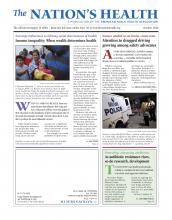People who develop asthma in adulthood could be at greater risk for heart-related health setbacks, such as stroke, according to a recent study.
The research, published Aug. 24 in the Journal of the American Heart Association, examined late-onset asthma, which the study defined as asthma diagnosed at 18 or older. While early-onset asthma, which is diagnosed in childhood, is linked to factors such as genetic history, late-onset asthma is linked to factors such as obesity and the environment. It is also not as responsive to traditional treatment, such as inhaled corticosteroids, researchers said.
“There’s overlap with cardiac symptoms and asthma symptoms, which is difficult to tease out,” Matthew Tattersall, DO, MS, lead study author and assistant professor in cardiovascular medicine at the University of Wisconsin School of Medicine and Public Health’s Department of Medicine, told The Nation’s Health. “Somebody who comes in with chest pain and problems breathing, that’s typical asthmatic symptoms or it could very well be cardiac symptoms.”
The study followed more than 1,200 participants in the Wisconsin Sleep Cohort for nearly 14 years. A total of 166 had asthma, with 111 diagnosed with late-onset asthma and 55 with early-onset asthma. All participants with asthma were compared to over 1,100 people without asthma.
Researchers also looked at their risk factors for cardiovascular events, such as smoking, body mass index, and whether they were already taking medications for conditions such as diabetes and hypertension. Over 220 cardiovascular events, such as heart failure, occurred among all participants.
The study found that rates of such events over 10 years, such as heart attack, were higher among people with late-onset asthma at a rate of 12.7 percent, compared with 3.8 percent for people with early-onset asthma. The rate was 8.9 percent for people without asthma.
Additionally, participants with late-onset asthma were more likely to be women, at 67 percent, compared with 44 percent of participants with early-onset asthma. Body mass index was also higher among people with late-onset asthma. And 22 percent of people with late-onset asthma took antihypertensive medications, compared with 16 percent of people with early-onset.
Tattersall said it is important for clinicians to identify patients at high risk for cardiovascular disease who could benefit from counseling and education on modifiable risk factors, such as smoking, that could lead to late-onset asthma. While the study defined late-onset asthma as asthma diagnosed at age 18 or older, the definition has also varied among public health professionals to include diagnosis over age 12 and over age 21, he added.
For more information, visit http://jaha.ahajournals.org/content/5/9/e003448.full.
- Copyright The Nation’s Health, American Public Health Association









